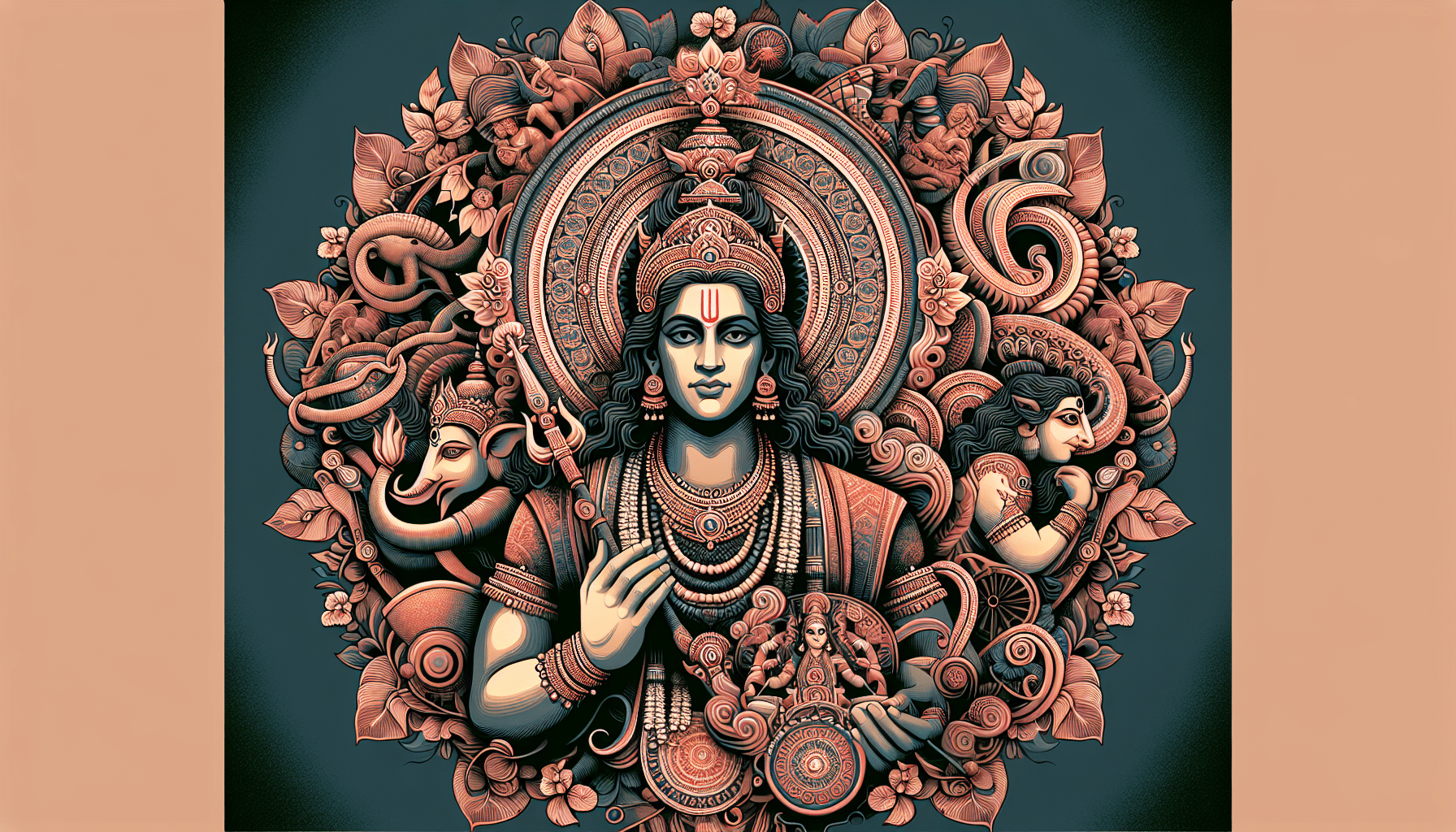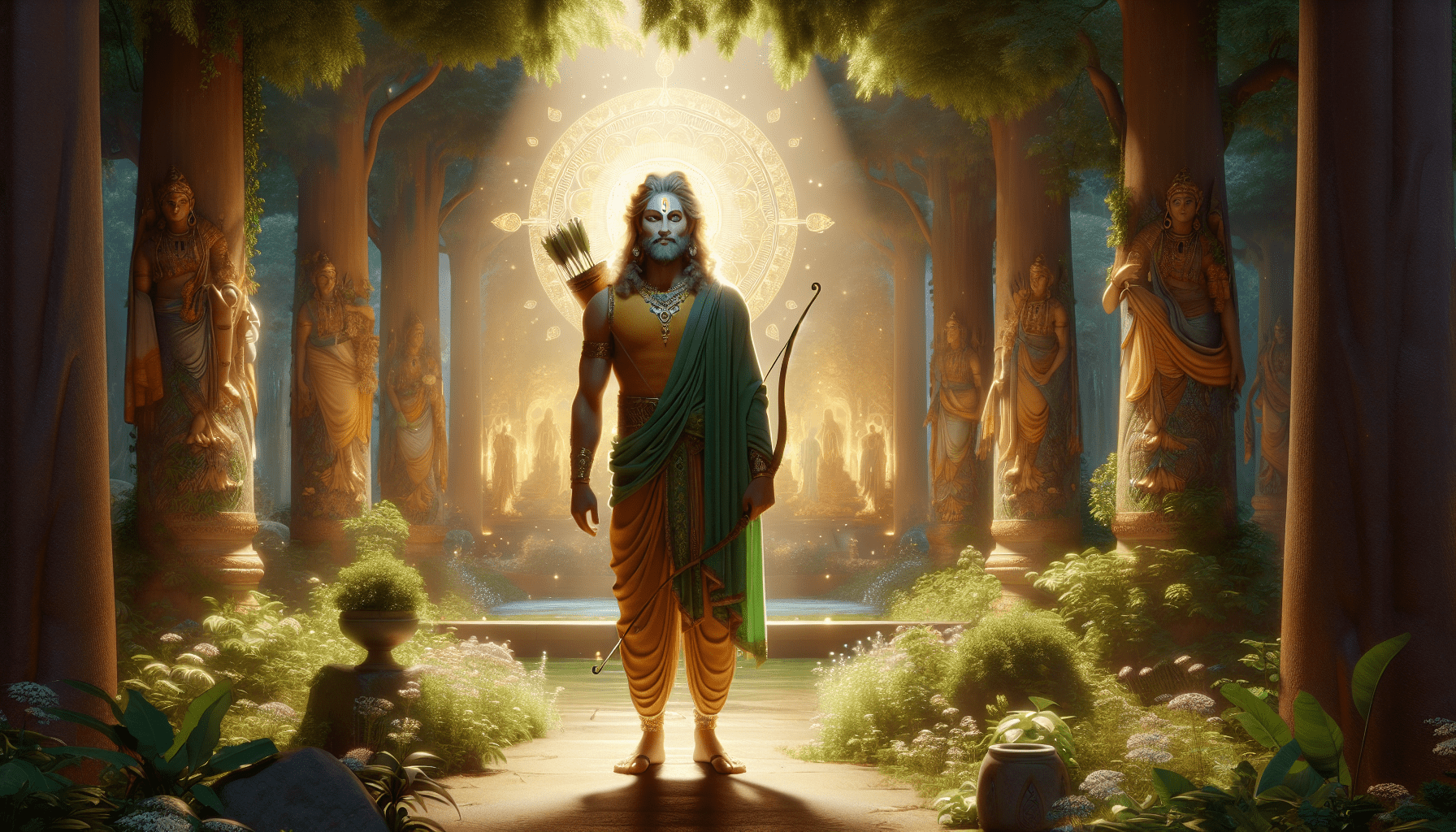In this captivating article, you will discover the essence and significance of Lord Ram. Exploring the timeless question of “What is Lord Ram?”, we will delve into the intricate tapestry of Hindu mythology, unveiling the noble qualities and divine role attributed to this revered deity. Embark on a journey of knowledge and enlightenment as we unravel the story behind Lord Ram and the impact he has had on the lives of millions around the world.

Table of Contents
Historical Importance
The Birth of Lord Ram
Lord Ram, one of the most revered deities in Hinduism, was born in the ancient kingdom of Ayodhya. He is believed to be the seventh avatar of Lord Vishnu, the Supreme Being. Lord Ram, also known as Maryada Purushottam, was born to King Dasharatha and Queen Kausalya. His birth is celebrated as Ram Navami, an auspicious festival observed by millions of devotees worldwide.
The Epic Ramayana
The story of Lord Ram is narrated in the epic Ramayana, written by sage Valmiki. The Ramayana is a timeless tale of love, bravery, and righteousness. It chronicles Lord Ram’s journey from his exile to his triumphant return to Ayodhya after defeating the demon king Ravana. The epic is not just a religious scripture but also a valuable source of moral teachings and life lessons.
Significance in Hinduism
Lord Ram holds great significance in Hinduism as the epitome of virtue and righteousness. He is revered as the ideal son, husband, and king. His life teaches devotees to follow the path of righteousness and fulfill their duties with dedication and love.
Religious Beliefs and Worship
Ram Bhakti
Ram Bhakti, or devotion to Lord Ram, is a fundamental aspect of Hindu worship. Devotees express their love and devotion through prayers, chanting of hymns, and reading scriptures such as the Ramayana. They believe that seeking Lord Ram’s blessings brings peace, prosperity, and spiritual fulfillment.
Ram Navami
Ram Navami, the auspicious day of Lord Ram’s birth, is celebrated with great enthusiasm and devotion across India. Devotees observe fasts, visit temples, and participate in religious processions. The atmosphere resonates with joy as devotees sing hymns and offer prayers to Lord Ram, seeking his blessings for a blessed and prosperous life.
Lord Ram’s Temples
temples dedicated to Lord Ram can be found throughout India and even in various parts of the world. The most famous among these is the Rama Mandir in Ayodhya, believed to be the birthplace of Lord Ram. These temples serve as sacred places where devotees can offer their prayers and seek divine blessings.
Characteristics and Attributes
The Ideal King
Lord Ram is revered as the ideal king, known for his impeccable sense of duty, justice, and leadership. He ruled his kingdom with wisdom, ensuring the welfare and happiness of his subjects. Lord Ram’s qualities as a ruler inspire leaders to follow his footsteps in governing with righteousness and compassion.
Righteousness and Dharma
Dharma, or righteousness, holds a central place in Lord Ram’s life and teachings. He upheld dharma in all situations, even when faced with the toughest challenges. Lord Ram’s unwavering commitment to righteousness teaches individuals to uphold moral values and make ethical choices in their lives.
Compassion and Love
Lord Ram’s character is imbued with compassion and love for all beings. He showed immense kindness to everyone, regardless of their social status or background. His love for his wife, Sita, and his devotion to his brothers exemplify the importance of love and strong familial relationships.
Lessons and Teachings
Importance of Loyalty
Lord Ram’s unwavering loyalty towards his family, especially towards his wife, Sita, is a significant lesson taught in the Ramayana. Despite the challenges they faced, Lord Ram remained devoted to Sita and supported her throughout their journey. This teaches individuals the value of loyalty and commitment in relationships.
Perseverance and Determination
Lord Ram’s journey to rescue Sita from the clutches of Ravana exemplifies perseverance and determination. He faced numerous obstacles but never let adversity deter him from his goal. Lord Ram’s story teaches individuals the importance of staying focused and determined in achieving their objectives, even in the face of challenges.
Victory of Good over Evil
The epic battle between Lord Ram and the demon king Ravana symbolizes the triumph of good over evil. Lord Ram’s victory represents the victory of righteousness and the defeat of evil forces. This teaches individuals to always have faith in the power of good and the ultimate victory of truth.

Impact on Indian Culture
Ram Leela
Ram Leela, a theatrical reenactment of Lord Ram’s life, is an integral part of Indian culture. It is performed during the festival of Navratri, especially in the northern parts of India. Ram Leela brings communities together and serves as a source of entertainment, moral education, and spiritual upliftment.
Influence on Literature and Arts
The Ramayana has inspired countless literary works, including poems, novels, and plays, in various Indian languages. It has also influenced various art forms, such as sculpture, painting, and dance. Lord Ram’s character and his epic tale continue to inspire artists to this day, showcasing the enduring impact of his story on Indian culture.
Festivals and Celebrations
Lord Ram’s influence on Indian culture is evident in the numerous festivals and celebrations dedicated to him. In addition to Ram Navami, festivals such as Diwali, Dussehra, and Hanuman Jayanti also commemorate Lord Ram and his divine powers. These festivals bring people together, fostering a sense of unity and devotion among devotees.
Lord Ram’s Divine Powers
The Avatar of Lord Vishnu
Lord Ram is believed to be an avatar, or incarnation, of Lord Vishnu. As an avatar, Lord Ram possesses the divine qualities and powers of Lord Vishnu. His incarnation serves as a divine intervention in times of chaos to restore peace and establish righteousness.
Supreme Protector
Lord Ram is considered the supreme protector, ensuring the welfare and safety of his devotees. Devotees believe that invoking Lord Ram’s name and seeking his blessings provide protection from all forms of evil and harm. Many turn to Lord Ram for solace and guidance during times of difficulty.
Blessings and Miracles
Devotees believe that Lord Ram showers his blessings upon those who sincerely seek his help. Many individuals narrate incidents of miraculous interventions where their problems were resolved or desires fulfilled through the grace of Lord Ram. These stories reinforce the faith and devotion in his devotees.
Comparison with Other Divine Figures
Lord Ram vs. Lord Krishna
Lord Ram and Lord Krishna are two prominent deities in Hinduism. While Lord Ram personifies righteousness and duty, Lord Krishna represents love and devotion. Both deities hold immense significance in Hindu mythology and are revered by millions of devotees. Their stories and teachings offer distinct lessons and perspectives on spirituality.
Ramayana vs. Mahabharata
The Ramayana and the Mahabharata are two ancient Indian epics that have shaped the religious and cultural landscape of India. While the Ramayana focuses on Lord Ram’s life journey and his pursuit of righteousness, the Mahabharata delves into complex family dynamics, dharma, and the battle between good and evil. Both epics offer profound insights into human nature, ethics, and the eternal struggle between virtue and vice.
Ram-Sita vs. Shiva-Parvati
The relationship between Lord Ram and his wife, Sita, serves as a symbol of love, trust, and devotion. Their story emphasizes the ideal qualities of a husband and wife. In contrast, Lord Shiva and his wife, Parvati, represent the divine union of masculinity and femininity, illustrating the balance of cosmic energies. Both couples embody different aspects of human relationships and divine harmony.
Controversies and Debates
Ram Janmabhoomi and Ayodhya
The debate surrounding the Ram Janmabhoomi in Ayodhya has been a long-standing issue in Indian society. The dispute revolves around the claim that the site in Ayodhya is the actual birthplace of Lord Ram and has been a matter of contention between different religious communities. The case has sparked emotional debates and legal battles, highlighting the deep-rooted historical and cultural significance associated with Lord Ram’s birthplace.
Criticism and Opposition
While Lord Ram is revered by millions, there have been critics who question the morality and actions depicted in the Ramayana. Some argue that Lord Ram’s actions, such as abandoning his wife Sita, raise questions about his character. However, these criticisms are subjective and open to interpretation, with differing views among scholars and devotees.
Ram in Politics and Society
Lord Ram’s influence extends beyond religious beliefs and has found its way into politics and society. Political leaders often invoke Lord Ram’s name to gain support and connect with the masses. His character and teachings continue to shape social norms and values, influencing the moral fabric of Indian society.
Lord Ram’s Cultural Influence Beyond India
Ramayana in Southeast Asia
The Ramayana has had a profound influence on the cultures of Southeast Asian countries such as Indonesia, Thailand, and Cambodia. The epic has been adapted into local languages and is performed through various art forms, including dance, theater, and puppetry. Lord Ram’s story has become an integral part of their cultural heritage, showcasing the widespread impact of his tale beyond India.
Ramchritmanas in Nepal
Ramchritmanas, a version of the Ramayana written by the poet Tulsidas, holds great cultural and religious significance in Nepal. It is considered a sacred text and has been embraced by the Nepalese people as a source of spiritual guidance and devotion. Lord Ram is revered in Nepal, and his story continues to resonate with the people, contributing to the cultural fabric of the nation.
Bhakti Movement and Ramayana’s Worldwide Spread
The Bhakti movement, a devotional movement that emerged in medieval India, played a crucial role in spreading the teachings of Lord Ram and the Ramayana. The movement emphasized personal devotion and love towards the divine, making Lord Ram a focal point of worship and spiritual reflection. As a result, the Ramayana’s influence spread across regions, captivating the hearts of devotees worldwide.
Modern Interpretation and Relevance
Ramayana in Contemporary Perspective
Even in the modern era, the Ramayana continues to resonate with individuals from all walks of life. Its timeless teachings of righteousness, love, and perseverance offer valuable insights into navigating the complexities of the present-day world. The epic serves as a moral compass, guiding individuals towards ethical choices and personal growth.
Ethical and Moral Values
Lord Ram’s character embodies ethical and moral values that hold relevance in society today. His lifelong commitment to upholding dharma, his compassion towards all beings, and his unwavering devotion to his responsibilities serve as powerful lessons for individuals striving to lead a meaningful and virtuous life.
Inspiration for Personal Growth
The story of Lord Ram and the moral lessons it imparts provide inspiration for personal growth and transformation. His journey from a prince to an exiled wanderer and eventually to a victorious king teaches individuals resilience, adaptability, and the power to overcome obstacles. Lord Ram’s story serves as a beacon of hope, reminding individuals of their own potential to rise above adversity and achieve greatness.
In conclusion, Lord Ram’s historical importance, religious beliefs and worship, characteristics and attributes, lessons and teachings, impact on Indian culture, divine powers, comparison with other divine figures, controversies and debates, cultural influence beyond India, and modern relevance make him a revered figure in Hinduism and a source of inspiration for millions worldwide. Lord Ram’s story continues to captivate hearts and minds, reminding individuals of the power of righteousness, love, and personal growth in navigating life’s challenges.